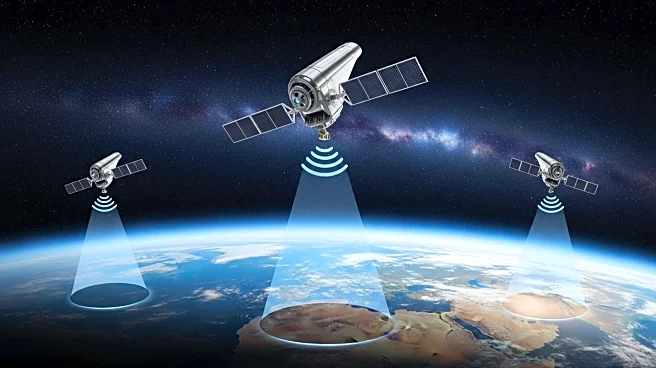What is the story about?
What's Happening?
Amazon is set to expand its Project Kuiper satellite constellation, aiming to double its size to over 200 satellites by the end of the year. This expansion will support broadband services in the United States, Canada, United Kingdom, Germany, and France by March 2026. Ricky Freeman, president of Kuiper Government Solutions, highlighted the operational status of the 102 satellites already deployed, which are moving towards their final orbital positions. Despite challenges with launch resources, Amazon plans additional launches in September, October, and November/December to reach its target. The constellation has demonstrated impressive performance, with downlink speeds of up to 1.8 gigabits per second and uplinks around 450 megabits per second. The project aims to provide continuous coverage and expand to approximately 26 countries by the end of 2026.
Why It's Important?
The expansion of Project Kuiper is significant for the satellite communications industry, as it promises enhanced broadband services across multiple countries. This development could lead to increased competition in the satellite internet market, potentially driving down costs and improving service quality for consumers. The project's open architecture approach, integrating third-party capabilities, suggests a shift towards more collaborative and flexible satellite systems. Additionally, the expansion aligns with growing interest in sovereign satellite programs, indicating a trend towards more localized and secure communications infrastructure. The success of Project Kuiper could also influence regulatory policies and spectrum allocation, impacting the broader telecommunications landscape.
What's Next?
Amazon plans to continue its satellite deployment, with further launches scheduled to achieve over 200 satellites by the year's end. By 2027, the project aims to incorporate land and maritime mobility services, achieving full global coverage by 2028. The company also plans to launch a second-generation constellation of an additional 3,200 satellites. As the industry evolves, potential market consolidation and technological advancements such as direct-to-device connectivity and artificial intelligence will shape the future of satellite communications. Stakeholders, including governments and businesses, will likely monitor these developments closely, considering their implications for global connectivity and security.
Beyond the Headlines
The expansion of Project Kuiper could have broader implications for global internet access, particularly in underserved regions. By providing reliable broadband services, Amazon's initiative may contribute to bridging the digital divide, enhancing educational and economic opportunities. The project's open architecture model could foster innovation and collaboration, encouraging the development of new applications and services. Additionally, the focus on cybersecurity and artificial intelligence highlights the importance of safeguarding communications infrastructure against emerging threats. As satellite technology advances, ethical considerations regarding data privacy and environmental impact will become increasingly relevant.















